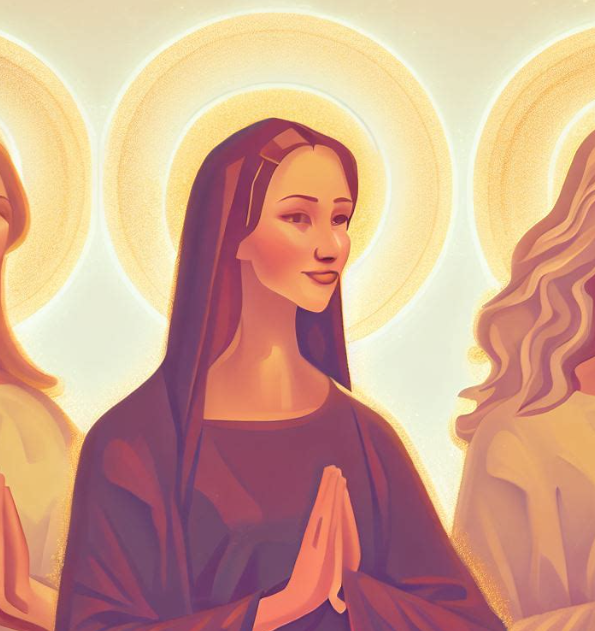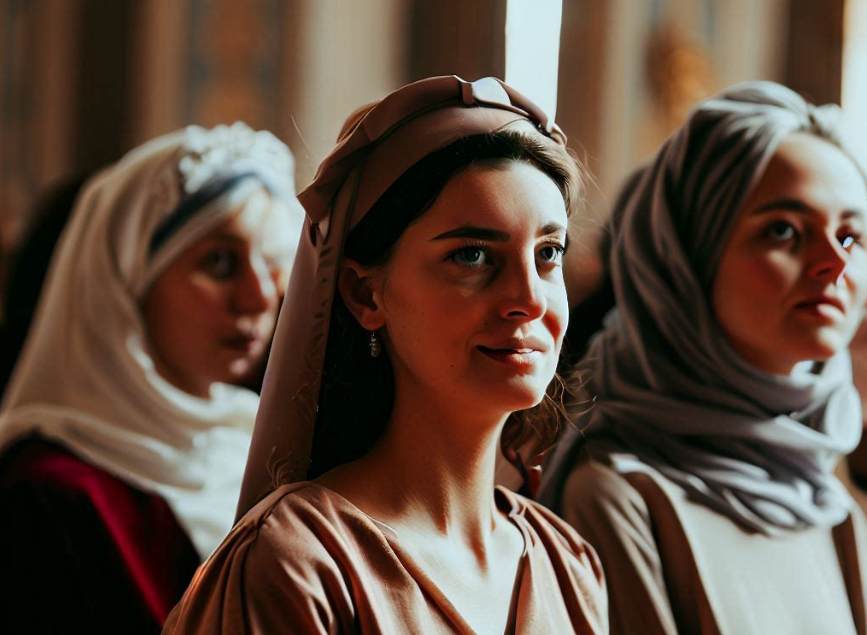Historical Perspectives on Women in Christianity

Historical perspectives on the role of women in Christianity is an expansive subject. Over the centuries, their roles varied significantly, playing a dynamic part in the development of Christian doctrine and practice.
Starting from the earliest ages of Christianity, women engaged in multiple facets of the religion’s development including evangelization, charity, and leadership. Some individuals were particularly prominent, like Phoebe, Priscilla, and Lydia, noted in the New Testament for their significant contributions. Their responsibilities were diverse and important, involving hosting church meetings, giving financial assistance, and serving in the important role of deacons.
As Christianity moved into the Medieval era, the spiritual sphere for women saw an augmentation, particularly through monasticism. The introduction and development of orders such as the Benedictines and Franciscans ushered in a new phase of spiritual activity for women. This period is revered for seeing powerful spiritual leaders rise to prominence. These protagonists, examples being Hildegard of Bingen, Julian of Norwich, and St. Clare of Assisi, held immense sway in shaping religious discussion and doctrine of their time.
As we venture into the Reformation period, the perspectives start to shift, with a clear acknowledgment of spiritual equality among sexes surfacing more prominently. Notwithstanding, it was also a time that tended to restrict women’s active involvement in the ecclesiastical sphere. Martin Luther, a chief figure of the era, was known for prescribing household duties to women, subtly shifting them away from church matters.
Despite the noted limitations, this era paradoxically saw the role of women blossom in novel ways. Across a multitude of Christian denominational landscapes, women continued to make their presence felt, demonstrating that the gender restrictions of the time could not hinder their active participation in their faith. So, the dynamic presence of women throughout the historical evolution of Christianity is an undeniable reality, giving a lot to think about in terms of the multi-faceted roles they have played and continue to play in shaping the contours of Christianity.
Women in Modern-day Christianity
Within the context of recent adaptations, women have begun to stake their claim as vital participants within the confines of modern Christianity, lending their voices and skills to a faith that was once almost exclusive to men. A significant pioneer in this realm was Mary Baker Eddy, who in the 19th century broke traditional molds by laying the foundation of the Christian Science Church. This particular denomination was inclusive, permitting women to undertake any ecclesiastical position, thus providing an early model for gender equality within the faith.
As the 20th century rolled in, an inevitable surge of change arrived with it. A pivotal shift in outlook was witnessed within Christianity, specifically regarding gender roles. A prime example of this evolution is the Protestant movement’s decision to integrate women into their religious proceedings more fully. Renowned bodies within this faith, such as the American Baptist Churches USA and the United Methodist Church, were instrumental in spearheading this change. They emerged as pioneers in ordaining women as ministers, thus shattering age-old barriers and providing a clear path for their female counterparts to follow.

The Charismatic movement also played an impactful role in this regard. They championed the idea that spiritual gifts surpass gender limitations, advocating for increased participation and leadership from women. This shift opened doors for women, setting a new paradigm that challenged previously held norms and perspectives within these religious settings.
In juxtaposition to these rapidly changing viewpoints, bodies like the Catholic and Orthodox Churches chose to uphold their traditional standards, retaining their male-only priesthood. Despite this perceived rigidity, they too made slight concessions, albeit in subtle manners. There was a subtle yet significant recognition of the force that women bring to the table, particularly in areas involving charity, education, and healthcare.
The wings of change have had their span over the religious realm, leading to a heightened visibility of women in modern-day Christianity. Groundbreaking moves by individuals like Mary Baker Eddy and institutions akin to the Protestant movement are a testament to this evolution. While some still maintain their strongholds on tradition, the involvement of women continues to increase. They are now seen as essential contributors to the faith, bringing forth diverse viewpoints and talents that can only enrich the very fabric of Christianity. This role diversification in the faith instills hope for a continued trend of increased participation by women, thus promising a future marked by diversity, inclusion, and equality within Christianity.
The Maturing of Christian Feminism
The unfolding narrative of Christian Feminism signifies a crucial and ever-evolving intersection that women share with Christianity. This unique fusion enables the threading of a delicate equilibrium between the reinforcement of their spiritual faith and well-accounted advocacy for gender parity. Advocates of Christian Feminism, from within the robust fabric of the Christian community, canvas for women’s rights by deftly employing scriptural references to question and counter patriarchal traditions.
Significant advancements have been seen within the domain of theology, heralded by women who bring to the fore unmatched insights and distinctive viewpoints. Esteemed personas such as Rosemary Radford Ruether, Elizabeth Schussler Fiorenza, and Mary Daly have cast a luminary aura on the Christian community. They have done so by shedding light on women’s concerns beyond just the periphery of the church, paving the way for discourse and potential reform within the wider social spectrum.
The dawn of the 21st century set the stage for a notable influx of women theologians armed with academic prowess. These women have made remarkable contributions to conversations centered around Christian spirituality, comprehensive theology, and the promotion of sustainable socio-cultural growth. The novel and empathetic lens they bring to comprehending the twin concepts of humanity and grace underlines the continually changing and varied role women are playing within the grand Christian chronicle.
The realm of Christianity is as diverse as its practitioners. Women, in particular, play an instrumental role in shaping and adding dynamism to the faith with invaluable contributions. Their actions and the inherent theology have created a climate of inspiration and challenge for contemporary Christian followers indeed for those of future generations. These women, armed with their relentless persistence in refashioning theology or their unwavering service towards humanity, have carved the niche of the female sphere in Christianity. Their journey is characterized by tenacity, bravery, and an unwavering spiritual faith that continues to invigorate the religion. Thus, the maturing of Christian Feminism stands as a beacon for the equilibrium between religion and gender equality.